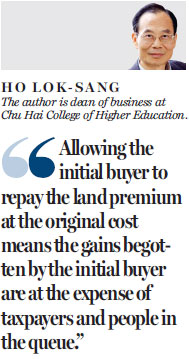Staying true to efficiency in public housing policy
Updated: 2016-10-12 09:33
By Ho Lok-sang(HK Edition)
|
|||||||||
Ho Lok-sang writes that while a multi-pronged approach to seeking and developing more land is warranted, extending more subsidies to public housing tenants is not the way forward
Our Hong Kong Foundation just released a report recommending a multi-pronged approach to seeking and developing more land, and a rent-or-purchase scheme for all public housing developments that allows the land premium repayment to be locked at the time the initial purchase is made. While I agree with the former proposal, I have to reject the latter on the grounds that it is neither fair nor efficient. Here I am specifically referring to what I call policy efficiency, i.e., efficiency defined in terms of achieving the original policy objective of the public housing policy, given the resources committed.
On the surface, the rent-or-purchase scheme, by vastly increasing the attractiveness of buying rather than renting the unit, will relieve the government of the burden of maintaining and managing the properties, and allow the government also to recover the rates which tenants currently do not have to pay. On the surface, the proposal offers a win-win outcome as certainly "revealed preference" indicates that the buyers benefit from the purchase relative to renting the units. But the story is a bit more complicated.
When buyers are allowed to repay the unpaid land premium at the land cost estimated at the time of the original purchase, we will expect three consequences, all of which take us further from the original goal of public housing policy:
First, the unit that is sold will have become no longer available to serve the purpose of housing those in the target group which public housing is intended to serve. A new unit will have to be constructed. If the unit is sold 10 years after it was first purchased, the government will have to find land 10 years later and its land cost will be a lot higher. Allowing the initial buyer to repay the land premium at the original cost means the gains begotten by the initial buyer are at the expense of taxpayers and people in the queue.

Second, the prospect of making money through public housing purchase will attract more applicants, including those who do not have an immediate housing need but who covets the possible capital gains. This will make it more difficult for those with real housing needs to procure a unit.
Third, rather than expediting the land premium repayment and allowing the public housing unit to "turn around" faster, there is a good chance that the initial buyer may choose to wait longer. As repayments of the land premium is frozen at the original cost, the longer the wait, the less in real terms the repayment is going to cost, since we can expect some inflation.
Some academics make the observation that the turnover rate of Home Ownership Scheme (HOS) units is much lower than that for private housing units, and conclude that this implies possible mismatching of the units with the needs of the occupiers. It is suggested that if there is a mismatch, private homeowners will switch to another unit that fits their requirements better. However, this conclusion just may not be right. In an online survey in 2011 the Centre for Public Policy Studies of Lingnan University found that HOS householders are clearly happier than their private housing counterparts. The happiness index for HOS owners was 7.53, while that for private flat owners was 7.15. Moreover, interestingly the "LIFE scores" (representing love, insight, fortitude, and engagement) are all higher among HOS owners than among private flat owners.
This suggests that there is probably not much mismatching. HOS householders just happen to be another type of people who are more concerned about anju leye, that is, "having a home and free from worries, and having a job that one enjoys".
Actually, all the data show that our current HOS units are oversubscribed each time. There is no problem with their prices being so unaffordable that there are not enough buyers. Any move to reduce the prices without correspondingly increasing supply substantially is unfair to those who have a great need for the units and are prepared to pay a price for them. Unless we can build so many units that the oversubscription rate has substantially declined, we are in no position to make the purchase more attractive, whether by reducing prices or by reducing the burden of land premium repayments.
Exactly because there is still an urgent need to find more land and build more homes, I totally agree with Our Hong Kong Foundation that a multi-pronged approach to land development is necessary.
Many commentators keep saying that we should develop brownfield sites first before we look for alternatives. This fixation on brownfield sites not only ignores the practical difficulty of finding alternative sites to house the existing economic activities on the brownfield sites, but also the possibility that the social cost of developing alternative sources of land may be lower and that the speed of development may be faster. People keep referring to Singapore as a city that manages to tackle its housing problems better than we do. But they forget that actually Singapore, with its smaller population, has land designated for residential purposes several times as big as that in Hong Kong.
(HK Edition 10/12/2016 page1)